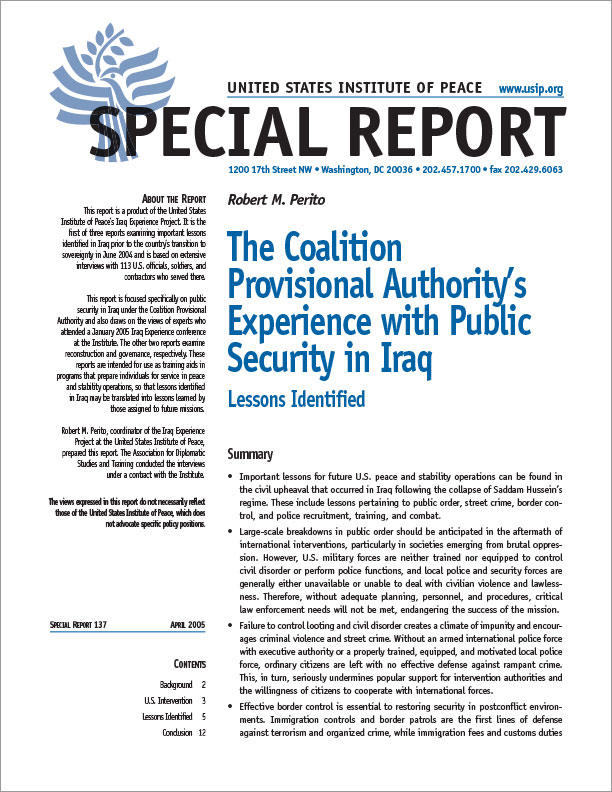The Coalition Provisional Authority's Experience with Public Security in Iraq: Lessons Identified

Summary
- Important lessons for future U.S. peace and stability operations can be found in the civil upheaval that occurred in Iraq following the collapse of Saddam Hussein's regime. These include lessons pertaining to public order, street crime, border control, and police recruitment, training, and combat.
- Large-scale breakdowns in public order should be anticipated in the aftermath of international interventions, particularly in societies emerging from brutal oppression. However, U.S. military forces are neither trained nor equipped to control civil disorder or perform police functions, and local police and security forces are generally either unavailable or unable to deal with civilian violence and lawlessness. Therefore, without adequate planning, personnel, and procedures, critical law enforcement needs will not be met, endangering the success of the mission.
- Failure to control looting and civil disorder creates a climate of impunity and encourages criminal violence and street crime. Without an armed international police force with executive authority or a properly trained, equipped, and motivated local police force, ordinary citizens are left with no effective defense against rampant crime. This, in turn, seriously undermines popular support for intervention authorities and the willingness of citizens to cooperate with international forces.
- Effective border control is essential to restoring security in postconflict environments. Immigration controls and border patrols are the first lines of defense against terrorism and organized crime, while immigration fees and customs duties provide an immediate source of earnings for new regimes that lack the administrative infrastructure to collect other types of revenue. A properly trained and equipped border guard may also offer intervention forces some measure of protection from external aggressors.
- In postconflict environments, local police are normally unprepared, unwilling, or unable to perform police functions. Even when local security personnel are re-equipped, retrained, and escorted by international police advisers, they still have difficulty adapting to new circumstances, providing police services, and gaining public acceptance. In addition, police institutions need to be reformed and new police officers need to be recruited.
- Police training is a resource-intensive process that takes at least five years under optimal conditions and requires civilian experts with specialized skills and extensive foreign experience. Attempts to rush the training of local police forces and to put "uniforms on the street"; inevitably fail to meet either the short-term need for immediate security or the long-term requirement for professional law enforcement personnel.
- International and indigenous police cannot operate effectively unless the intervention military force is able to create a safe and secure environment. Without a reasonable level of public order, police will be fully engaged in providing for their own security, leaving the civilian population defenseless against common crime. This situation is exacerbated if the intervention military force utilizes local police as auxiliaries or even as strike forces against paramilitaries.
About the Report
This report is a product of the United States Institute of Peace's Iraq Experience Project. It is the first of three reports examining important lessons identified in Iraq prior to the country's transition to sovereignty in June 2004 and is based on extensive interviews with 113 U.S. officials, soldiers, and contractors who served there.
This report is focused specifically on public security in Iraq under the Coalition Provisional Authority and also draws on the views of experts who attended a January 2005 Iraq Experience conference at the Institute. The other two reports examine reconstruction and governance, respectively. These reports are intended for use as training aids in programs that prepare individuals for service in peace and stability operations, so that lessons identified in Iraq may be translated into lessons learned by those assigned to future missions.
Robert M. Perito, coordinator of the Iraq Experience Project at the United States Institute of Peace, prepared this report. The Association for Diplomatic Studies and Training conducted the interviews under a contract with the Institute.
The views expressed in this report do not necessarily reflect views of the United States Institute of Peace, which does not advocate specific policy positions.



